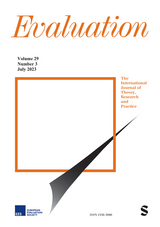
What works in democracy support? How to fill evidence and usability gaps through evaluation
Leininger, Julia / Armin von SchillerExternal Publications (2024)
in: Evaluation 30 (1), 7-26
DOI: https://doi.org/10.1177/13563890231218276
Open access
The evidence generated and used in development cooperation has changed remarkably over the last decades. When it comes to the field of democracy support, these developments have been less significant. Routinised, evidence-based programming is far from a reality here. Compared to other fields, the goals of the interventions and assumed theories of change remain underspecified. Under these circumstances, evaluating and learning is difficult, and as a result, evidence gaps remain large and the translation of evidence into action often unsuccessful. This is particularly dramatic at a time when this field is regaining attention amid global autocratisation trends. In this article, we analyse the specific barriers and challenges democracy support faces to generate and use evidence. Furthermore, we identify evidence gaps and propose impact-oriented accompanying research as an evaluation approach that can make a significant contribution towards advancing the evidence agenda in this field.


